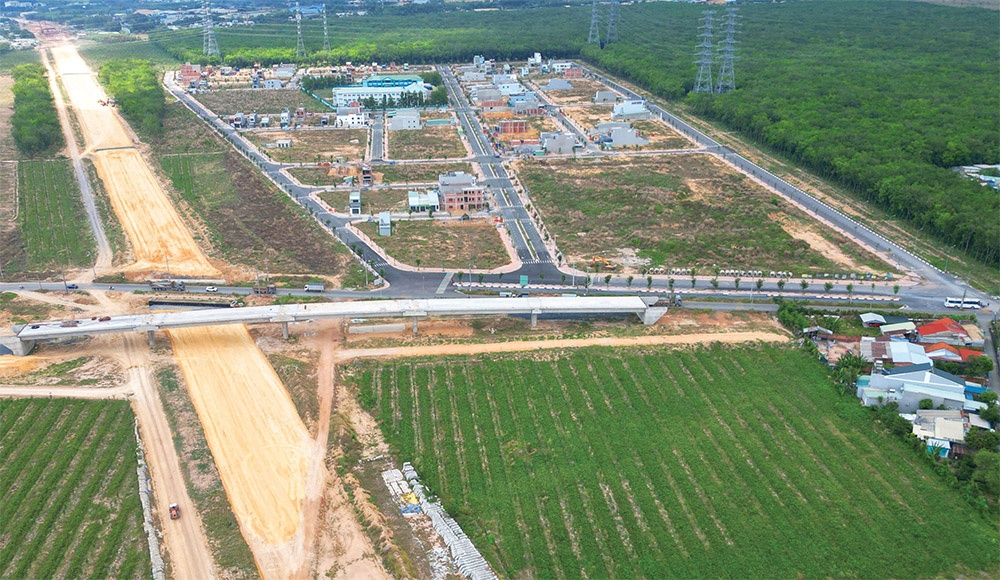INTERNATIONAL INVESTMENT
AND PORTAL
 The market is being shaped by emerging segments and flexible cooperation models, photo Le Toan
The market is being shaped by emerging segments and flexible cooperation models, photo Le Toan
Speaking to VIR, Ivan Kalungi Clausen, co-founder of new data aggregation platform Civitas, said that Vietnam’s real estate potential is stronger than ever.
“It still feels like a hidden gem for foreign capital, even with the growth seen so far. The first four months of 2025 marked the highest disbursement in five years, up 46 per cent on-year. A young workforce, the China+1 shift, and last year’s updated land law all point to even more foreign investment ahead,” said Clausen.
He added that industrial and high-tech manufacturing, as well as apparel suppliers relocating from China, are among the most attractive segments.
Mid-income housing and rentals are also drawing attention. “A 40-million-strong middle class is chasing first homes, while younger talent shows strong demand for serviced apartments,” he said.
Meanwhile, hospitality and resort segments are seeing a revival, with 17 million visitors recorded in 2024. Coastal redevelopment and island eco-projects are also back on the agenda. Clausen noted that demand for data centres and cold storage is also increasing, with e-commerce volumes having doubled since 2022.
“Opportunity evaluations remain slow and inaccurate, but the land law, administrative streamlining, and clearer zoning now give us the tools to move quickly,” he added. “High housing demand, together with new expressways, ring roads, and metro lines, means Ho Chi Minh City will expand rapidly. Space and opportunities must be identified quickly, and we aim to ensure that momentum is nurtured and multiplied.”
Civitas is set to launch its first platform in Vietnam in mid-July. “We’re eager to partner with forward-thinking asset managers and property owners who want to ride this wave with us,” Clausen said.
Meanwhile, according to Richard D. McClellan, founder of RMAC Advisory, Resolution No.68-NQ/TW on private sector overhaul can help real estate development and establish a new social contract between the state and the business community.
“It calls for a level playing field across all sectors, equal access to land and capital, clearer and more consistent regulation, and comprehensive legal reforms to reduce administrative friction and increase investor trust,” McClellan said.
Tasks such as building a unified land database and connecting with national systems are expected to enhance transparency, accelerate compensation and site clearance, and resolve thousands of stalled projects.
The resolution also mandates that the reserved land ratio must be at least 20 hectares or 5 per cent of the total land area after infrastructure investment, depending on the local context, but must not fall below the minimum threshold.
“As a result, investors will no longer be free to lease entire land plots to the highest bidders, but will be required to reserve space for priority businesses in urgent need of production space,” McClellan said.
The market is also being shaped by emerging segments and flexible cooperation models. One standout is the data centre sector, which is experiencing strong growth. Vietnam is viewed as having high potential to become a regional data hub. Major corporations such as Nvidia, Gaw Capital, Viettel IDC, and CMC Telecom are ramping up investments in this space.
Louis Nguyen, chairman and CEO of Saigon Asset Management, which announced a $1.5 billion data centre campus in March, said that Vietnam aims to position itself as a regional and global digital technology hub, with a particular focus on attracting foreign investment in data centres.
“International investor interest in Vietnam’s data infrastructure is closely linked to major US cloud providers, particularly AWS, Google Cloud, and Microsoft Azure, which together account for around 65 per cent of the global cloud market,” Nguyen told VIR.
“While AWS and Google have shown strong interest in Vietnam, they remain cautious, awaiting greater regulatory clarity on the Data Law before committing to large-scale investments.”
He added that the remainder of the cloud market is largely dominated by Chinese tech firms such as ByteDance, Alibaba, and Tencent, which are more willing to invest in Vietnam due to regulatory similarities in data and cybersecurity frameworks between the two countries.
Unlocking capital for Vietnam’s data centre sector, Nguyen said, will require business-friendly updates to the Data Law – set to take effect on July 1 – that are aligned with international standards.
“Additionally, focusing on critical infrastructure such as dedicated conventional power, availability of renewable energy, water resources, and direct subsea cable access will be vital in attracting hyperscalers and boosting Vietnam’s presence in the regional data centre market,” he said.
 Buying sprees experienced in Vietnam’s real estate
Buying sprees experienced in Vietnam’s real estate
Despite the challenging economic environment, Vietnam’s commercial real estate market remains promising for foreign investors as well as local developers: the latter is heavily injecting capital to acquire land, while the former continue to step up their deals.



















